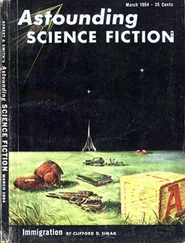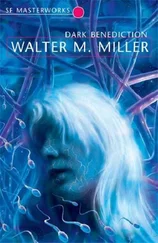He moved slowly down the aisle, pausing at each seat to bless and embrace before he left the plane. The plane taxied onto the runway and roared aloft, He watched until it disappeared from view in the evening sky. Afterward, he drove back to the abbey and to the remainder of his flock. While aboard the plane, he had spoken as if the destiny of Brother Joshua’s group were as clear-cut as the prayers prescribed for tomorrow’s Office; but both he and they knew that he had only been reading the palm of a plan, had been describing a hope and not a certainty. For Brother Joshua’s group had only begun the first short lap of a long and doubtful journey, a new Exodus from Egypt under the auspices of a God who must surely be very weary of the race of Man.
Those who stayed behind had the easier part. Theirs was but to wait for the end and pray that it would not come.
“The area affected by local fallout remains relatively stationary,” said the announcer, “and the danger of further windspread has nearly vanished…”
“Well, at least nothing worse has happened yet,” remarked the abbot’s guest. “So far, we’ve been safe from it here. It looks like we’ll stay safe, unless the conference falls apart.”
“Will we now,” Zerchi grunted. “But listen a moment.”
“The latest death toll estimate,” the announcer continued, “on this ninth day after the destruction of the capital, gives two million, eight hundred thousand dead. More than half of this figure is from the population of the city proper. The rest is an estimate based on the percentage of the population in the fringe and fallout areas known to have received critical doses of radiation. Experts predict that the estimate will rise as more radiation cases are reported.
“This station is required by law to broadcast the following announcement twice daily for the duration of the emergency: ‘The provisions of Public Law 10-WR-3E in no way empower private citizens to administer euthanasia to victims of radiation poisoning. Victims who have been exposed, or who think they have been exposed, to radiation far in excess of the critical dosage must report to the nearest Green Star Relief Station, where a magistrate is empowered to issue a writ of Mori Vult to anyone properly certified as a hopeless case, if the sufferer desires euthanasia. Any victim of radiation who takes his own life in any manner other than that prescribed by law will be considered a suicide, and will jeopardize the sight of his heirs and dependents to claim insurance end other radiation relief benefits under the law. Moreover, any citizen who assists such a suicide may be prosecuted for murder. The Radiation Disaster Act authorizes euthanasia only after due process of law. Serious cases of radiation sickness must report to a Green Star Relief—”
Abruptly, and with such force that he twisted the dial knob free of its shaft, Zerchi switched off the receiver. He swung himself out of his chair and went to stand at the window and look down on the courtyard where a crowd of refugees were milling around several hastily built wooden tables: The abbey, old and new, was overrun by people of all ages and stations whose homes had been in the blighted regions. The abbot had temporarily readjusted the “cloistered” areas of the abbey to give the refugees access to virtually everything except the monks’ sleeping quarters. The sign outside the old gate had been removed, for there were women and children to be fed, clothed, and given shelter.
He watched two novices carrying a steaming cauldron out of the emergence kitchen. They hoisted it onto a table and began ladling out soup.
The abbot’s visitor cleared his throat and stirred restlessly in his chair. The abbot turned.
“Due process, they call it,” he growled. “Due process of mass, state-sponsored suicide. With all of society’s blessings.”
“Well,” said the visitor, “it’s certainly better than letting them die horribly, by degrees.”
“Is it? Better for whom? The street cleaners? Better to have your living corpses walk to a central disposal station while they can still walk? Less public spectacle? Less horror lying around? Less disorder? A few million corpses lying around might start a rebellion against those responsible. That’s what you and the government mean by better, isn’t it?”
“I wouldn’t know about the government,” said the visitor, with only a trace of stiffness in his voice. “What I meant by better was ‘more merciful.’ I have no intention of arguing your moral theology with you. If you think you have a soul that God would send to Hell if you chose to die painlessly instead of horribly, then go ahead and think so. But you’re in a minority, you know. I disagree, but there’s nothing to argue about.”
“Forgive me,” said Abbot Zerchi. “I wasn’t getting ready to argue moral theology with you. I was speaking only of this spectacle of mass euthanasia in terms of human motivation. The very existence of the Radiation Disaster Act, and like laws in other countries, is the plainest possible evidence that governments were fully aware of the consequences of another war, but instead of trying to make the crime impossible, they tried to provide in advance for the consequences of the crime. Are the implications of that fact meaningless to you, Doctor?”
“Of course not, Father. Personally, I am a pacifist. But for the present we’re stuck with the world as it is. And if they couldn’t agree on a way to make an act of war impossible, then it is better to have some provisions for coping with the consequences than to have no provisions.”
“Yes and no. Yes, if it’s in anticipation of somebody else’s crime. No, if it’s in anticipation of one’s own. And especially no if the provision to soften the consequences are criminal too.”
The visitor shrugged. “Like euthanasia? I’m sorry, Father, I feel that the laws of society are what makes something a crime or not a crime. I’m aware that you don’t agree. And there can be bad laws, ill-conceived, true. But in this case, I think we have a good law. If I thought I had such a thing as a soul, and that there was an angry God in Heaven, I might agree with you.”
Abbot Zerchi smiled thinly. “Yon don’t have a soul, Doctor. You are a soul. You have a body, temporarily.”
The visitor laughed politely. “A semantic confusion.”“
“True. But which of us is confused? Are you sure?”
“Let’s not quarrel Father. I’m not with the Mercy Cadre. I work on the Exposure Survey Team. We don’t kill anybody.”
Abbot Zerchi gazed at him in silence for a moment. The visitor was a short muscular man with a pleasant round face and a balding pate that was sunburned and freckled. He wore a green serge uniform, and a cap with the Green Star insignia lay in his lap.
Why quarrel, indeed? The man was a medical worker, not an executioner. Some of the Green Star’s relief work was admirable. Occasionally it was even heroic. That in some instances it wrought evil, according to Zerchi’s belief, was no reason to regard its good works as tainted. The bulk of society favored it, and its workers were in good faith. The doctor had tried to be friendly. His request had seemed simple enough. He had been neither demanding nor officious about it. Still, the abbot hesitated before saying yes.
“The work you want to do here — will it take long?”
The doctor shook his head. “Two days at most, I think. We have two mobile units. We can bring them into your courtyard, hitch the two trailers together, and start right to work. We’ll take the obvious radiation cases, and the wounded, first. We treat only the most urgent cases. Our job is clinical testing; The sick ones will get treatment at an emergency camp.
Читать дальше








